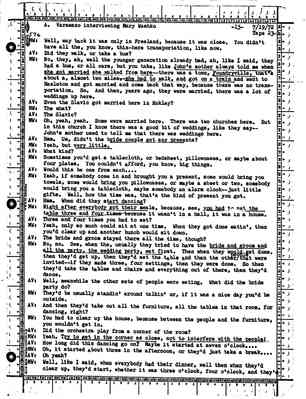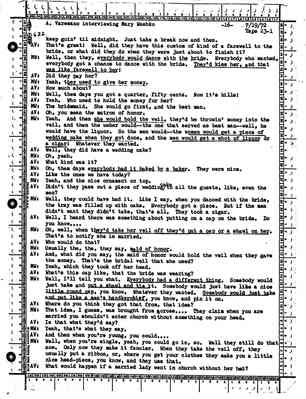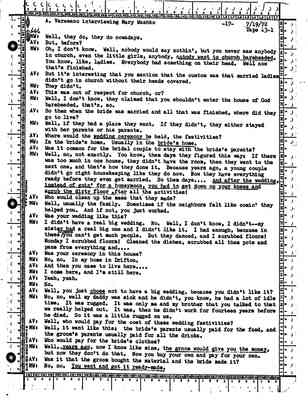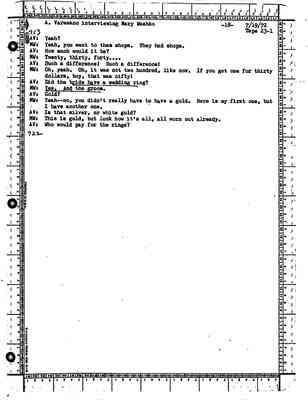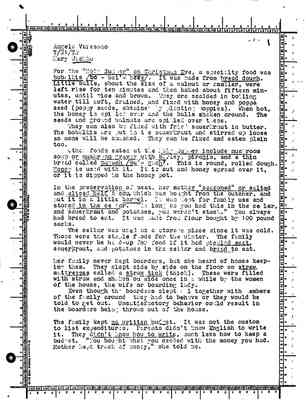Pages
20
A. Varesano interviewing Mary Washko -15- 7/19/72 Tape 23-1 MW: Well, way back it was only in Freeland, because it was close. You didn't have all the, you know, this-here transportation, like now. AV: Did they walk, or take a bus? MW: No, they, ah, well the younger generation already had, ah, like I said, they had a bus, or all cars, but you take, like John's mother always told me when she got married she walked from here--there was a town, Foundryville, that's about a, almost two miles--she had to walk, and got on a train and went to Hazleton and got married and come back that way, because there was no transportation. So. And then, years ago, they were married, there was a lot of weddings up here. AV: Even the Slavic got married here in Ecklet? MW: The what? AV: The Slavic? MW: Oh, yeah, yeah. Some were married here. There was two churches here. But in this church I know there was a good bit of weddings, like they say--John's mother used to tell me that there was weddings here. AV: Hmm. Um, didn't the bride couple get any presents? MW: Yeah, but very little. AV: What kind? MW: Sometimes, you'd get a tablecloth, or bedsheet, pillowcases, or maybe about four plates. You couldn't afford, you know, big things. AV: Would this be one from each.... MW: Yeah, if somebody come in and brought you a present, some would bring you towels, some would bring you pillowcases, or maybe a sheet or two, somebody would bring you a tablecloth, maybe somebody an alarm clock--just little gifts. Well, how the time was, that's the kind of present you got. AV: Hmm. When did they start dancing? MW: Right after everybody got their meals, because, see, you had to set the table thrree and four times because it wasn't in a hall, it was in a house. AV: Three and four times you had to set? MW: Yeah, only so much could sit at one time. When they got done eatin', then you'd clear up and another bunch would sit down. AV: The bride and groom stayed there all the time, though? MW: No, no. See, when the, ususally they tried to have the bride and groom and all the party, the wedding party, eat first. Then when they would get done, then they'd get up, then they'd set the table and then the other people that were invited--if they made three, four settings, then they were done. So then they'd take the table and chairs and everything out of there, then they'd dance. AV: Well, meanwhile the other sets of people were eating. What did the bride party do? MW: They'd be usually standin' around talkin' or, it is was a nice day you'd be outside. AV: And then they'd take out all the furniture, all the tables in that room, for dancing, right? MW: You had to clear up the house, because between the people and the furniture, you wouldn't get in. AV: Did the orchestra play from a corner of the room? MW: Yeah. Try to get in the corner as close, not to interfere with the people! AV: How long did the dancing go on? Maybe it started at seven o'clock.... MW: Oh, it started about three in the afternoon, or they'd just take a break.... AV: Oh yeah? MW: Well, like I said, when everybody had their dinner, well then when they'd clearn up, they'd start, whether it was three o'clock, four o'clock, and they'd
21
A. Varesano interviewing Mary Washko -16- 7/19/72 Tape 23-1 keep goin' til midnight. Just take a break now and then. AV: That's great! Well, did they hae this custom of kind of farewell to the bride, or what did they do when they were just about to finish it? MW: Well, then they, everybody would dance with the bride. Everybody who wanted, everybody got a chance to dance with the bride. They'd kiss her, and that was like farewell to her! AV: Did they pay her? MW: Yeah, they used to give her money. AV: How much about? MW: Well, them days you got a quarter, fifty cents. Now it's bills! AV: Yeah. Who used to hold the money for her? MW: The bridesmaid. She would go first, and the best man. AV: Oh, you mean the matron of honor. MW: Yeah. And then she would hold the veil, they'd be throwin' money into the veil, and then the usher would--the one that served as best man-- well, he would have the liquor. So the men would--the women would get a piece of wedding cake when they got done, and the men would get a shot of liquor or a cigar! Whatever they wanted. AV: Well, they did have a wedding cake? MW: Oh, yeah. AV: What kind was it? MW: Oh, them days everybody had it baked by a baker. They were nice. AV: Like the ones we have today? MW: Yeah, and the nice ornament on top. AV: Didn't they pass out a piece of wedding cake to all the guests, like, even the men? MW: Well, they could have had it. Like I say, when you danced with the bride, the tray was filled up with cake. Everybody got a piece. But if the men didn't want they didn't take, that's all. They took a cigar. AV: Well, I heard there was something about putting a cap on the bride. Do you know.... MW: Oh, well, then they'd take her veil off they'd put a cap or a shawl on her. That's to notify she is married. AV: Who would do that? MW: Usually, the, the, they say, maid of honor. AV: And, what did you say, the maid of honor would hold the veil when they gave the money. That's the bridal veil that she used? MW: Yeah, which they took off her head. AV: What's this cap like, that the bride was wearing? MW: Well, I'll tell you what. Everybody had a different thing. Somebody would just take and put a shawl and tie it. Somebody would just have a nice little round cap, you know. Whatever they wanted. Somebody would just take and put like a men's handkerchief, you know, and pin it on. AV: Where do you think they got that from, that idea? MW: That idea, I guess, was brought from across.... They claim when you are married you shouldn't enter church without something on your head. AV: Is that what they'd say? MW: Yeah, that's whay they say. AV: And then when you're young, you could.... MW: Well, when you're single, yeah, you could go in, so. Well they still do that now. Only now they make it fancier. When they take the veil off, they usually put a ribbon, or, where you get your clothes they make you a little nice head-piece, you know, and they use that. AV: What would happen if a married lady went in church without her hat?
22
A. Varesano interviewing Mary Washko -17- 7/19/72 Tape 23-1
MW: Well, they do, they do nowadays. AV: But, before? MW: Oh, I don't know. Well, nobody would say nothin', but you never saw anybody in church, even the little girls, anybody, nobody went to chuch bareheaded. You know, like, ladies. Everybody had something on their head. Well now that's finished. AV: But it's interesting that you mention that the custom was that married ladies didn't go to church without their heads covered. MW: They didn't. AV: This was out of respect for church, or? MW: Well, I don't know, they claimed htat you shouldn't enter the house of God bareheaded, that's, so. AV: So then when the bride was married and all that was finished, where did they go to live? MW: Well, if they had a place they went. If they didn't, they either stayed with her parents or his parents. AV: Where would the wedding ceremony be held, the festivities? MW: In the bride's home. Usually in the bride's home. AV: Was it common for the bridal couple to stay with the bride's parents? MW: Well, no, not exactly. You know, them days they figured this way. If there was too much in one house, they didn't have the room, then they went to the next one, and that's how they done it. Because years ago, a young couple didn't go right housekeeping like they do now. Now they have everything ready before they even get married. So them days...And after the wedding, instead of goin' for a honeymoon, you had to get down to your knees and scrub the dirty floors after all the activities! AV: Who would clean up the mess that they made? MW: Well, usually the family. Sometimes if the neighbors felt like comin' they helped you. And if not, you just worked. AV: Was your wedding like this? MW: I didn't have a real big wedding. No. Well, I don't know, I didn't - my sister had a real big on and I didn't like it. I had enought, because in these homes you can't get much people. But they danced, and I scrubbed the floors! Monday I scrubbed floors! Cleaned the dishes, scrubbed all them pots and pans from everything and... AV: Was your ceremony in this house? MW: No, no. In my home in Drifton. AV: And then you came to live here... MW: I come here, and I'm still here. AV: Yeah, yeah. MW: So. AV: Well, you just chose not to have a big wedding, because you didn't like it? MW: No, no, well my daddy was sick and he didn't, you know, he had a lot of idle time. It was rugged. It was only me and my brother that you talked to that we really helped out. It was, then he didn't work for fourteen years before he died. So it was a little rugged on us. AV: Well, who would pay for the cost of these wedding festivities? MW: Well, it went like this: the bride's parents usually paid for the food, and the groom's parents usually paid for all the drinks. AV: Who would pay for the bride's clothes? MW: Well, years ago, now I know like mine, the groom would give you the money, but now they don't do that. Now you buy your own and pay for your own. AV: Was it that the groom bought the material and the bride made it? MW: No, no. You went and got it ready-made.
23
A. Varesano interviewing Mary Washko -18- 7/19/72 Tape 23-1
AV: Yeah? MW: Yeah, you went to them shops. They had shops. AV: How much would it be? MW: Twenty, thirty, forty... AV: Such a difference! Such a difference! MW: Oh, yeah. Oh, it was not two hundred, like now. If you got on for thirty dollars, boy, that was nifty! AV: Did the bride have a wedding ring? MW: Yes. And the groom. AV: Gold? MW: Yeah--no, you didn't really have to have a gold. Here is my first one, but I have another one. AV: Is that silver, or white gold? MW: That is gold, but look how it's all, all work out already. AV: Who would pay for the rings?
24
Angelo Varesano -17/21/72 Mary Wasko
For the "Holy Supper" on Christmas Eve, a specialty food was bobalkis /bo-bal'-kees/. It was made from bread dough. Little balls, about the size of a walnut or smaller, were left rise for ten minutes and then baked about fifteen minutes, until nice and brown. They were scalded in boiling water till soft, drained, and fixed with honey and popaseed (poppy seeds, obtained by planting poppies). When hot, the honey is spilled over the balls shaken around. The seeds and ground walnuts are spilled over these. They can also be fixed with fresh sauerkraut in butter. The bobalkis are put in the sauerkraut and stirred up loose so none will be smashed. They can be fixed and eaten plain too. Other foods eaten at the Holy Supper include mushroom soup or mushroom gravy with barley, pirohis, and a thin bread called pagach /pa-goch/. This is round, rolled dough. Honey is used with it. It is cut and honey spread over it, or it is dipped in the honey pot.
In the preservation of meat, her mother "seasoned" or salted and sliced half a cow, which was bought from the butcher, and put in a little barrel. It was kept for family use and stored in the cellar. As long as you had this in the cellar, and sauerkraut and potatoes, you weren't stuck." You always had bread to eat. It was made from flour bought by 100 pound sacks. The cellar was used as a storage place since it was cold. Those were the staple foods for the winter. The family would never be hard-up for food if it had pickled meat, sauerkraut, and potatoes in the cellar and bread to eat.
Her family never kept boarders, but she heard of homes keeping them. They slept side by side on the flood on straw mattresses called a straw tick (thick). These were filled with straw and shaken outside in a while the women of the house, the wife or boarding lady. Even though the boarders slept all together with members of the family around, they had to behave or they would be told to get out. Unsatisfactory behavior could result in the boarders being thrown out of the house.
The family kept no written budget. It was not the custom to list expenditures. Parents didn't know English to write it. They didn't know how to write, much less how to keep a budget. "You bought what you needed with the money you had. Mother kept track of money," she told me.
